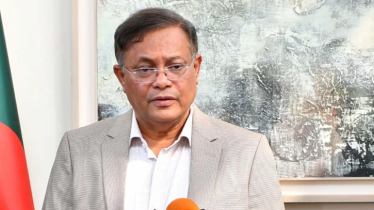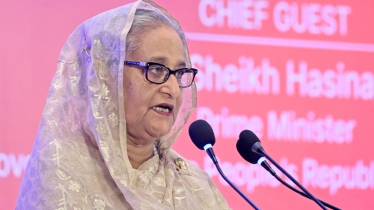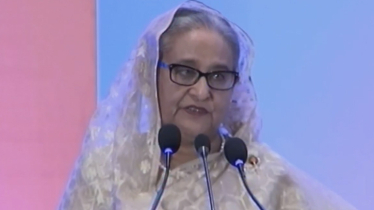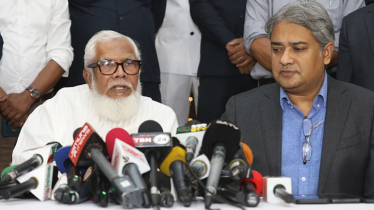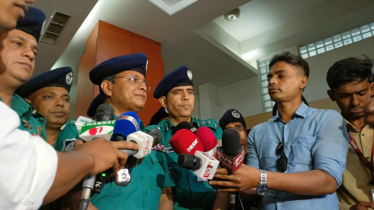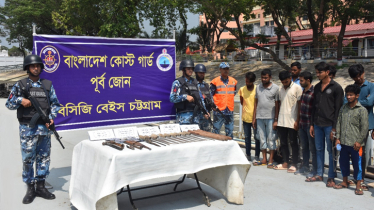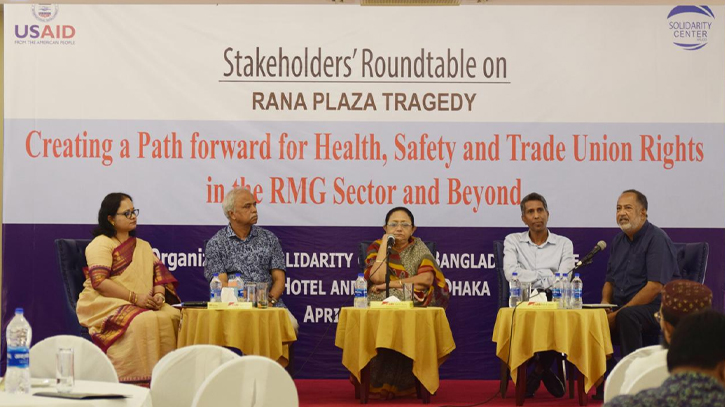
Photo: Collected
Speakers at a roundtable meeting have called upon authorities concerned to include workers’ security-related provisions into labour laws and ensure trade union rights to uphold workplace safety for a democratic Bangladesh.
They made the call at a roundtable, titled “Creating a Path Forward for Health, Safety and Trade Union Rights in the RMG Sector and Beyond”, organised by Solidarity Center at a Dhaka hotel on Monday (29 April), commemorating the 11th anniversary of Rana Plaza Tragedy.
Addressing the event, former Member of Parliament Shirin Akhter said, “It is mandatory to resolve the cases related to the Rana Plaza incident.
“The victims should be identified and rehabilitated and the reasons behind the incident should be identified to ensure that it does not happen again in the future. Before the 12th anniversary of the incident, we, as a country, should be able to say that we have done it,” Akhte added.
The function was also addressed, among others, by the President of Bangladesh Revolutionary Garment Workers’ Federation Salahuddin Shapon, General Secretary of Sommilito Garment Workers’ Federation Khadija Akter, Executive Director of Safety and Rights Sikandar Ali Mina, Director of Karmojibi Nari Sunzida Sultana, and District and Session Judge of Labor Appellate Tribunal Dhaka M A Awal.
The seminar adopted a number of recommendations including setting up hospitals for workers in labour-intensive areas, speedy resolution of Rana Plaza-related cases, reinstating the International Accord, bringing workers’ safety provisions into labour laws, proper implementation of Bangladesh Labour Act and minimum wage structure in the labour sector, identifying workplace hazards, and developing women leadership.
Solidarity Center Deputy Country Program Director Monika Hartsel said, “Still to this day, there are thousands of workers in the readymade garment sector and in a wide range of other sectors who do not have access to safe and healthy workplaces.”
“There is violence and harassment against trade leaders and workers who stand up for their rights on the job. With the murder of union leader and organiser Shahidul Islam, and the four workers killed and many more injured during the minimum wage protests, this past year was a painful reminder that the industry is not yet safe,” she added.
Solidarity Center Country Program Director AKM Nasim said, “We should ensure that Safety Committees are formed at workplaces in a proper and transparent manner”.
He said these committees should be made effective, particularly through the active involvement of worker representatives. Currently, the meaningful contribution of worker representatives in the Safety Committees as outlined in the Bangladesh Labour Act and rules is lacking.
He also said, “DIFE’s (Department of Inspection for Factories and Establishment) role should prioritise accountability. It is essential for DIFE to be effective in ensuring workers’ safety across all sectors.”
Syed Sultan Uddin Ahmed, executive director of the Bangladesh Institute of Labor Studies (BILS), said that following the Rana Plaza incident, the International Labor Organization (ILO) declared workers' occupational safety and health a fundamental right.
“The wage revision for garment workers every five years has also been introduced after this incident. But to ensure all this, we don’t see any activities of the Department of Inspection of Factories and Establishments,” he said.
Messenger/Sumon


